

The construction elevator of One World Trade Center in Lower Manhattan is attached to the outside of the 104-story tower. From the ground it looks like a giant zipper, moving slowly up and down as the car, filled with workers and their tools, makes the six-minute, 1,776-foot journey from ground level to the top. (The building’s height was purposefully designed to match our year of independence.)
Riding up in that elevator to the 103rd floor recently, I kept myself a safe distance from the steel gates that protect you but also, unfortunately, allow you to see how high up you are hanging in space. I had to “man up” just to step into the metal box.
Phil English, a shop steward at the tower for LIUNA (Laborers’ International Union of North America), one of several unions that have members working to complete the tower, rode up with me. (See LIUNA World Trade Center videos here.) He laughed when he said he wanted to ride on the window-washing contraption attached to the outside of the top floor.
» Read more about: One World Trade Center: More Than Ground Zero »
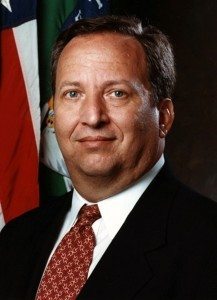

In the fall of 2011, millions of Americans were drawn to a movement directly challenging dramatically rising income inequality. The Occupy Movement dominated public discourse and put economic unfairness at the center of policy debates. Yet only two years after Occupy began on Wall Street, efforts to redress still worsening income inequality have stalled. The national grassroots campaign to get House Republicans to enact immigration reform has not been matched by similar efforts to raise the minimum wage or end corporate tax loopholes, with advocacy for such policies no stronger today than before Occupy’s emergence. We even face the prospect of President Obama selecting Lawrence Summers, a longtime backer of the One Percent, as the new head of the Federal Reserve. Are activists preoccupied with other issues, or have people decided that challenging the power of the One Percent is not a winnable political fight?
This past weekend I came across two documentaries about dramatic wealth inequality in the United States: Alex Gibney’s November 2012,
President Barack Obama was scheduled to speak this week at the AFL-CIO Convention in Los Angeles. As a delegate, I was very excited and looked forward to seeing him again. I had heard him here last summer during the 2012 presidential campaign. It was truly an unforgettable experience: He spoke to us like an organizer, sharing personal stories and pushing his base to get up and lead the next generation of progressive activism. Everyone knows he’s an incredible speaker, but to witness his strength and oratory skills in person is something immensely moving and inspiring.
Beyond that, however, our country is at a critical moment with the economy and the attempts to rebuild the middle class, and he was going to join the one and only Senator Elizabeth Warren in addressing the issues that working people struggle with every day.
(Above: President Barack Obama addresses AFL-CIO delegates via video.)
But something happened on the way to the convention.
» Read more about: AFL-CIO Convention: There’s Still Time, Mr. President »
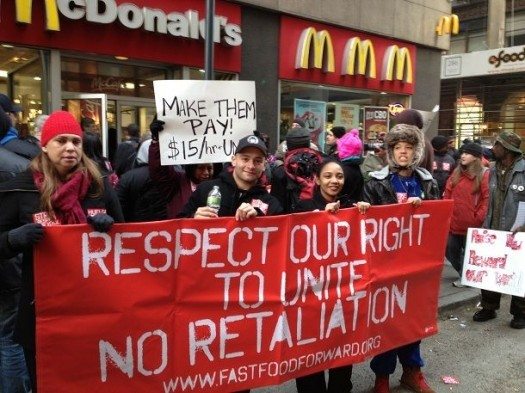
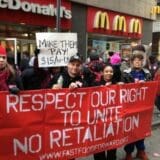
Labor Day may be over, but if the recent strikes in 60 cities are any indication, fast food workers intend to keep turning up the heat on a vast American industry built around poverty wages. For the first time, this mega-sector that grosses $200 billion a year is under serious scrutiny, as increasingly emboldened employees across the country demand a living wage from immensely profitable corporations sensitive to their public image.
While the focus on fast food workers’ paltry wages is well deserved, there’s another issue that demands attention: the rampant violation of labor laws by fast food giants.
It’s bad enough that 83 percent of workers in this industry earn less than $10.10 an hour — the average fast food cook, for example, makes $9.02 an hour or $18,760 a year — while typically being denied health insurance and other benefits.


 September’s shaping up to be another tough month for Martha Sellers. The Walmart cashier cleared $732 on her last twice-monthly paycheck but hasn’t paid this month’s $700 rent on her place in Bellflower. When she does, she’ll have to decide how much of the remaining $32 will be divided between food and gas to get her to the job she’s held for the past 10 years.
September’s shaping up to be another tough month for Martha Sellers. The Walmart cashier cleared $732 on her last twice-monthly paycheck but hasn’t paid this month’s $700 rent on her place in Bellflower. When she does, she’ll have to decide how much of the remaining $32 will be divided between food and gas to get her to the job she’s held for the past 10 years.
“I am just always broke, always late on things,” Sellers says. “Thank goodness I have a nice landlord who understands.”
Sellers’ employer, however, is not so understanding. Sellers makes $13 an hour, which on paper doesn’t look too bad when compared to many other Walmart workers’ salaries, which tend to run less than $9 an hour. The problem is that the retail giant is continually cutting her hours, so that the $13 doesn’t tell the whole story.
“When I first started I worked 35,
» Read more about: Walmart Workers Fight Poverty: A Cashier’s Story »
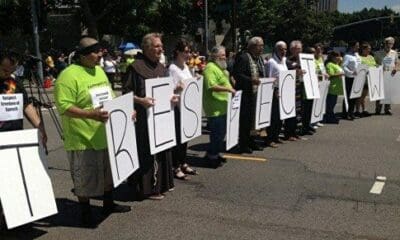

My friend Allison is a United Methodist minister. Her husband, Andy, pastors a United Church of Christ congregation. Both serve churches in Pasadena. Both of them have been involved in advocacy for the workers at Walmart.
Allison’s father, Alan, is also a United Methodist minister and an old friend of mine who lives in Honolulu, where he took the lead to start a faith-based advocacy organization that has made a strong impact on the city. So Alan has earned some progressive credibility. Andy told me that the last time he visited his in-laws in Honolulu, Alan and he were on their way back home from a golfing excursion, when Alan announced he was going “to pick up a few things at Walmart.”
Andy was aghast and said, “You shop at Walmart?”
“Well, of course I do,” said Alan, “And don’t tell me that Allison doesn’t!”
“No, she never shops there!”
“Really?” said Alan.
» Read more about: Saying ‘No’ to Walmart’s Inhuman Resources »
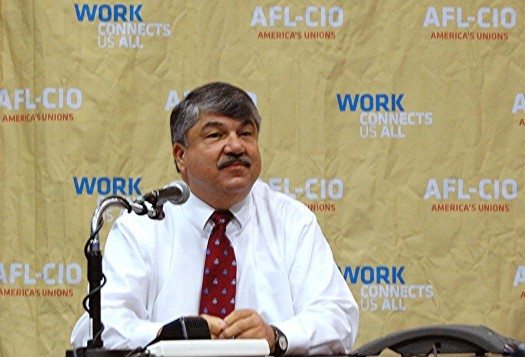
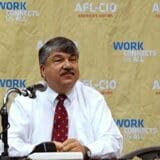
Massachusetts Senator Elizabeth Warren opened the AFL-CIO’s quadrennial convention in Los Angeles yesterday with a stirring tribute to the legacy of organized labor and a call to arms for the country’s progressive cause.
Speaking before about 5,000 cheering delegates at the L.A. Convention Center, Warren rolled out a list of issues near to labor’s heart. These included a raise in the minimum wage, tougher policing of Wall Street and government investment in infrastructure, jobs and education. She also called for transparency in the Obama administration’s ongoing secret negotiations of the Trans-Pacific Partnership (TPP) trade agreement.
She reserved some of her harshest words for what she called “the increasing corporate capture of the federal courts” and charged that Supreme Court Justices Alito and Roberts topped the list of the most pro-corporate and anti-consumer justices of the past 50 years.
The remarks were in sync with those of AFL-CIO President Richard Trumka,
» Read more about: AFL-CIO Convention: Inclusiveness and Bridge-Building »


 The number of families with children and at least one unemployed parent jumped by 33 percent in recent years, going from 2.4 million to 3.2 million households between 2005 and 2011, the U.S. Census Bureau reported.
The number of families with children and at least one unemployed parent jumped by 33 percent in recent years, going from 2.4 million to 3.2 million households between 2005 and 2011, the U.S. Census Bureau reported.
The Great Recession – the nation’s worst in decades – caused much of the increase, the Census Bureau said in an Aug. 27 statement, adding that some states, such as Florida, Nevada, Hawaii, Connecticut, New Jersey, California and North Carolina had growth rates higher than the national average.
Those states had a range of 54 percent for North Carolina to 148 percent for Nevada. Florida, for example, had a 93 percent increase in families with at least one unemployed parent and California had a rate of 61 percent, the Census Bureau said, citing its America’s Families and Living Arrangements: 2012 report.
“During the recession, economic well-being worsened for families with children,” Jamie Lewis,
» Read more about: Unemployment in American Families With Kids Jumps »

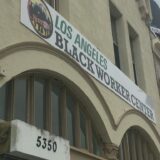
This Friday, the Los Angeles Black Worker Center (BWC) is holding its first-ever Black Workers Congress to bring workers and the Los Angeles community together to build support and share knowledge to transform the jobs crisis in communities of color.
The Workers Congress will be held at the Holman United Methodist Church on W. Adams Boulevard in Los Angeles starting at 8 a.m. PDT.
Black Worker Center Director Lola Smallwood Cuevas:
“The Black Worker Congress is about building blueprint for strategy and action directed by unemployed, underemployed and unionized black workers together. The black job crisis is one of the greatest worker rights travesties in America. This congress is an opportunity for labors to be directed by the community and see how they can help black workers move forward action steps to contest the economic violence terrorizing our families and destroying the social fabric of our community.”
» Read more about: African American Labor Group Debuts “Workers Congress” »


 Retail giant Walmart suffered a setback in Los Angeles Superior Court Wednesday when Judge Allan J. Goodman ruled that Burbank’s city government improperly greenlighted Walmart’s plans to put a store in the sprawling Empire Center shopping complex.
Retail giant Walmart suffered a setback in Los Angeles Superior Court Wednesday when Judge Allan J. Goodman ruled that Burbank’s city government improperly greenlighted Walmart’s plans to put a store in the sprawling Empire Center shopping complex.
Goodman, according to the Burbank Leader, “citing street improvements more than a dozen years overdue and a flawed environmental impact report, [said] that the city of Burbank must rescind building permits it issued to Walmart.”
Walmart had planned to open an outlet (which would include a grocery store) in an old Great Indoors space next year, but three Burbank residents filed a suit to block that plan. (The Empire Center, which sits on former Lockheed property, already includes a Target and Lowe’s, and a Costco is located adjacent to the center.)
City News Service reported that the plaintiffs contended “that having a Walmart at the site would violate a zoning law banning grocery stores in the center.
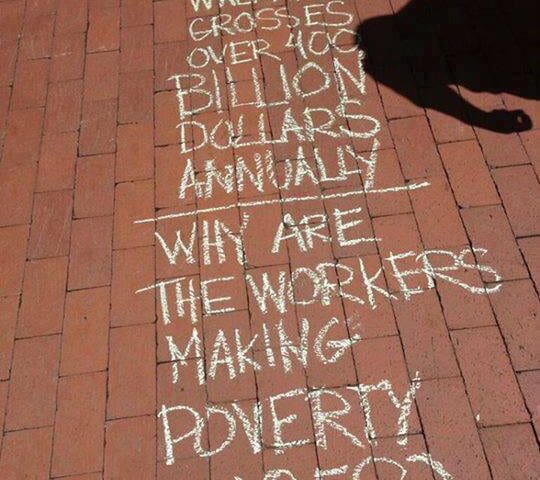

Dear Walmart Management,
 I am the pastor at Fairview Community Church in Costa Mesa, California. A few months ago, on June 25, 2013, along with six fellow pastors from around the nation, I visited the Lakewood Walmart with the hope of discussing the retaliations that have taken place nationwide following a worker strike and demonstration in Bentonville, Arkansas. We came to beseech you to reinstate Jovani Gomez, an associate of the Lakewood Walmart who we believe was fired unjustly following his participation in that action.
I am the pastor at Fairview Community Church in Costa Mesa, California. A few months ago, on June 25, 2013, along with six fellow pastors from around the nation, I visited the Lakewood Walmart with the hope of discussing the retaliations that have taken place nationwide following a worker strike and demonstration in Bentonville, Arkansas. We came to beseech you to reinstate Jovani Gomez, an associate of the Lakewood Walmart who we believe was fired unjustly following his participation in that action.
We were unable to discuss Mr. Gomez’s case, or any of the firings or retaliations. We were hardly able to discuss anything at all. Instead, we were met inside the store just a few feet from the entrance by one of the store’s managers, who made it clear that we were not welcome inside Walmart (he actually stated as much). Incredibly, this manager then called the police on seven peaceful pastors who simply wished to discuss Walmart’s recent actions toward their employees.
» Read more about: Minister to Walmart: You Can’t Fire God »


Shadows reach,
dapple the asphalt.
Hawks whoop,
surfing air.
Tumble weeds cling
ready to roll.
Desert breath blows,
tree tops twist.
Sweat salts my skin.
I itch.
All it takes is one
red spark.
I kneel down—watch
as the wind
picks it up. I withdraw,
stare
at what I’ve unleashed
on every channel
No one knows.
Nothing can stop it.
I burn.
I don’t need anyone,
closer now—so high
I can’t stop.
———————————————————–
Marilyn N. Robertson’s work has been published in Speechlessthemagazine, The Boston Literary Magazine, Chopin with Cherries, A Tribute in Verse, and is forthcoming in The Poetry Mystique, to be published by Duende Books. She was a featured reader in “Viva Poetry,”
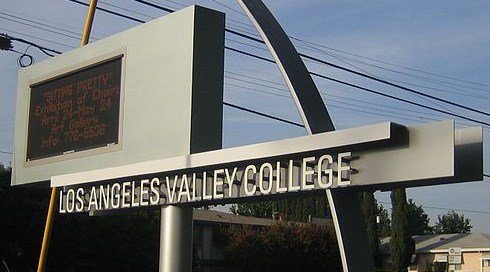

President Obama [has] released a plan to combat rising college costs and make college affordable for American families. The president’s plan outlines three proposals: tying federal student aid to college performance based on yet-to-be developed college rankings; promoting innovation and completion by instituting a college scorecard that would give consumers clear, transparent information on college performance to help them make the decisions that work best for them; and ensuring that student debt remains affordable by expanding eligibility for the Pay As You Earn repayment program. While this federal push is new, many of the ideas have already been tried and tested on the state level, and California’s community college system in particular provides some important data on what we should expect as these proposals are developed.
As a student who has attended community college and is attending a public university, I applaud President Obama for taking this step toward ensuring an affordable higher education for all.
» Read more about: California Community Colleges: Models for Curbing Costs »


Many of us try to be diligent about putting our empty bottles and cans in the blue recycling bin, but what do we do with our apple peels and coffee grounds? Can our lunch leftovers impact the air we breathe and the local economy?
All too often, these food scraps end up in a landfill, where they decompose and emit dangerous levels of methane — a greenhouse gas considered 21 times more damaging to the climate than carbon dioxide. Businesses and residents from the City of Los Angeles send approximately 1.2 million tons of food scraps and yard waste into landfills each year, equivalent to the weight of 600,000 automobiles. Such compostable “organic” material forms nearly a third of California’s landfilled waste.
Recycling instead of landfilling our organic materials only improves our environment, it creates jobs. The Tellus Institute calculated that recovering and recycling our organic materials creates nearly twice the number of jobs as when the same materials are disposed.
» Read more about: How Leftovers Will Let Us Breathe Easier and Create Jobs »


Benjamin Gamboa doesn’t know John Arnold, but they are linked by a shared concern over the fate of public-employee pensions in California.
“I’m proud to have a pension,” the 30-year-old Gamboa says. “I believe every American should have a pension.”
The two men live in very different worlds. Gamboa is a research analyst at Crafton Hills College in Yucaipa, California. Arnold is a hedge-fund billionaire from Houston, Texas.
There’s another difference between them: Arnold recently had a representative present at a secret “pension summit” held at a Sacramento hotel, where strategies to limit public employee retirement benefits were discussed; Gamboa, a union member, did not – representatives of labor were specifically not invited.
“Pension reform” has become the latest battle cry in a seemingly endless war that has ostensibly been declared against tax-dollar waste, but whose single-minded purpose has been to slash the job protections and benefits enjoyed by California’s working middle class.
» Read more about: Slash and Burn: The War Against California Pensions »


 Congress will reconvene shortly. That means more battles over taxes and spending, regulations and safety nets, and how to get the economy out of first gear. Which means more gridlock and continual showdowns over budget resolutions and the debt ceiling.
Congress will reconvene shortly. That means more battles over taxes and spending, regulations and safety nets, and how to get the economy out of first gear. Which means more gridlock and continual showdowns over budget resolutions and the debt ceiling.
But before the hostilities start again and we all get lost in puerile politics and petty tactics, it’s useful to consider what’s really at stake for our economy and democracy.
For much of the past century, the basic bargain at the heart of America was that employers paid their workers enough to buy what American employers were selling. Government’s role was to encourage and enforce this bargain. We thereby created a virtuous cycle of higher living standards, more jobs, and better wages. And a democracy that worked reasonably well.
But the bargain has been broken. And until it’s remade, the economy can’t mend and our democracy won’t be responsive to the majority.
» Read more about: Why We Fight: Restoring the American Dream »


As the New York Times reported on August 27 (“At Charter Schools, Short Careers By Choice”) most charter school teachers only remain in the profession for two to five years. In contrast, traditional public school teachers average nearly fourteen years of experience. But in the fantasy world of charter school proponents, far from being a shortcoming this lack of teaching experience is a positive. One charter school official told the Times, “There is a certain comfort level that we have with people who are perhaps going to come into YES Prep and not stay forever.” Wendy Kopp, whose Teach for America program is criticized for high turnover, said “The strongest schools develop their teachers tremendously so they become great in the classroom even in their first and second years.”
I’ve never met a teacher who believes they were “great” in their first two years.
» Read more about: Charter School Kool-Aid: Experience “Doesn’t Matter” »


 Why are so many Americans wary of labor unions? Unions are, after all, good for everyone who works for a living. In occupations with a high rate of unionization all the workers get paid more, even employees who aren’t in a union. As rates of unionization have fallen, so has compensation. One might expect unions to be all the rage with anyone who ever put in a hard day’s work. But this is not always the case, particularly in the United States.
Why are so many Americans wary of labor unions? Unions are, after all, good for everyone who works for a living. In occupations with a high rate of unionization all the workers get paid more, even employees who aren’t in a union. As rates of unionization have fallen, so has compensation. One might expect unions to be all the rage with anyone who ever put in a hard day’s work. But this is not always the case, particularly in the United States.
Americans have WEIRD attitudes towards unions – as in, Western, Educated, Industrialized, Rich, and Democratic. The Canadian behavioralists who coined this acronym were interested in how sweeping generalizations about human psychology and economic behavior might be incorrect if they were based on only one kind of (WEIRD) people, and reviewed a number of cross-cultural studies to make their point. To scholars at the University of British Columbia,


 We couldn’t resist. The Fourth of July is the biggest and baddest of all barbecue bonanzas, and so we decided the Union Cookout needed a sequel for Labor Day. Labor 411 is here with our follow-up to last year’s grill special that includes some of the best union-made picnic and party goods around.
We couldn’t resist. The Fourth of July is the biggest and baddest of all barbecue bonanzas, and so we decided the Union Cookout needed a sequel for Labor Day. Labor 411 is here with our follow-up to last year’s grill special that includes some of the best union-made picnic and party goods around.
(Reposted from Labor 411.)
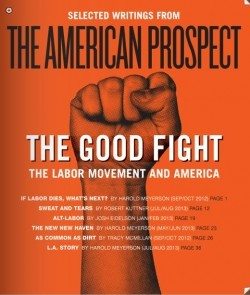

 Check out this handy collection of American Prospect stories on the state of labor and the labor movement in the U.S. The anthology, The Good Fight, can be browsed online or downloaded for offline reading.
Check out this handy collection of American Prospect stories on the state of labor and the labor movement in the U.S. The anthology, The Good Fight, can be browsed online or downloaded for offline reading.
It features pieces by Robert Kuttner, Tracy McMillan, Josh Eidelson and Harold Meyerson — including Meyerson’s recent profile of the Los Angeles Alliance for a New Economy, “L.A. Story.”
Perfect reading for this Labor Day weekend!